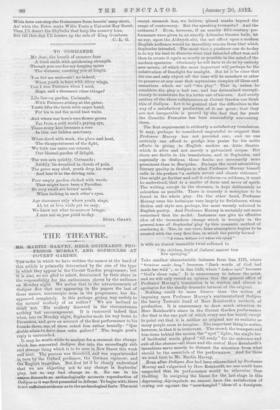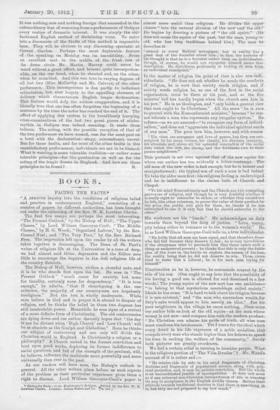THE THEATRE.
.MR. MARTIN HARVEY, HERR IbEINHARDT, PRO- FESSOR MURRAY, AND SOPHOCLES AT COVENT GARDEN.
Tits order in which we have written the names at the head of this article is. primarily determined by the size of the type in Which they appear' in the Covent Garden programme; but it also we are gm to admit, determined by their share in the responsibility for the enthusiasm shown by the audience on Monday night. We notice that in the advertisements of Oedipus Rex that are appearing in the papers the last of these names, microscopic even in the programme, has dis- appeared completely. Is this perhaps giving way. unduly to the natural modesty of an author P We are inclined to think not. His. modesty deserved in the circumstances nothing but- encouragement. It is rumoured indeed that when, late on Monday night, Sophocles made his way home to Pat-simians, and gave an account of the first performance to his friends there, one of them asked him rather brutally : "Que
allais-tu faire dans cetto galore P " The tragic poet's reply is unrecorded.
It may be worthwhile to analyse fora:mon:tent the change which has :converted Oedipus Rex into the exceedingly rich and strange thing which is to be seen in Bow Street this week and next: The process was threefold, and was superintended in turn by the Oxford professor, the German regisseur, and the English tragedian. But first let it be clearly understood that we are objecting not 'to any change in Sophocles' play, but to • any bad change in it. No one in his senses demands an arobseologically accurate reproduction of Oedipus as it was first presented in Athens. To begin with, there is not sufficient:evidence as to the arehteologieal facts. The most
recent research has, we believe, placed masks beyond the range of controveray.• But the speaking trumpets ? And the cothurni ? Even, however, if an exactly fifth-century per- formance were given in an exactly Athenian theatre built, let us say, upon the Aldwych site the net effect upon a modern English audience would be incredibly remote from that which Sophocles intended. The most that a producer can do to-day is to try his best to discover what that intended effect was, and then to create it again as nearly as possible in the mind cf the
modern spectator. Obviously he will have to do so by entirely new means, of which the most important willperhaps be the substitution of limelight for sunlight. But la it be clear that hia one and only object all the time will be somehow or other to preserve atnny cost that mysterious complex of ideas and sensations which we call "the play." That is, unless he considers the play a bad one, and has determined surrepti- tiously to substitute for it a better one of his own. And surely neither of the three collaborators at Covent Garden can think this of Oedipus. Let it be granted that the difficulties in the way of a satisfactory production of it are great ; that they arc not insuperable is proved by the .fact that for years the ComCdie Francaise has been successfully overcoming them.
The first requirement is evidently a satisfactory translation. It may, perhaps, be considered ungrateful to suggest that Professor Murray has not provided one ; and no one certainly can afford to grudge him praise for his noble efforts in giving to English readers an Attic theatre which is alive and not merely a galvanized corpse. But there are faults in his translations, and in Sophocles, and especially in Oedipus, these faults are necessarily more .prominent than in Euripides. Perhaps the most astonishing literary quality in Oedipus is what Professor Murray himself calls in his preface "a certain severe and classic reticence." One might go further and call it coldness—a coldness, it must he understood, that is a matter of form and never of spirit. The writing, except in the choruses, is kept deliberately as colourless as possible. There is scarcely a metaphor to be found in the whole play. On the other baud, Professor Murray owes his technique very largely to Swiuburne, whose diction and style are, perhaps, the most warmly coloured in English poetry. And Professor Murray is certainly not more restrained than his model. Instances can give no effective idea of the tremendous change which is wrought in the general tone of Sophocles' play by this romantic method of rendering it. The, in our view, false atmosphere begins to be created with the very first line, in which the purely formal "a Timm, KAuov Tor, irtiAcit oh' TpoqSi "
is with an almost insensible twist softened to
"My children, fruit of Cadmus' ancient tree New springing."
Take another characteristic instance from line 1175, where " 0E0.04scos swam 6ss4" becomes "Dark words of God had made her wild"; or in line 1428, where " GA13pos 1spds" becomes " God's clean rain." It is unnecessary to labour the point, and we will only record an opinion that the general effect of Professor Murray's translation is to weaken and almost to apologize for the deadly dramatic interest of the original.
Nothing could be more bizarre than the notion of imposing upon Professor Murray's sentimentalized Oedipus the heavy Teutonic hand of Herr Reinhardt's methods of production. It is unnecessary to draw much attention to Herr Reinhardt's share in the Covent Garden performance (for that is the one part of which every one has heard) except to point out that it is neither so original nor so realistic as many people seem to imagine. The important thing to notice, however, is that it is irrelevant. The crowd, the trumpets and tom-toms behind the scenes, the " spot" lights, the single bar of incidental music played "till ready" for the entrance and exit of the chorus—all these and thsf rest of Herr Reinhardt's inventions serve merely to distract the attention from what should be the essentials of the performance. And for these
we must turn to Mr. Martin Harvey. .
Even after Oedipus Res had been etherealized by Professor Murray and vulgarized by Herr Reinhardt, no one could have suspected that its performance would be otherwise than thrilling. In assigning the blame for the last stage in this depressing agringolade we cannot have the satisfaction of crying out against- the " new-fangled ideas of a foreigner. It was nothing new and nothing foreign that succeeded in the extraordinary feat of removing from a performance of Oedipus every vestige of dramatic interest. It was simply the old- fashioned English method of declaiming verse. To enter into a discussion of the faults of this method is impossible here. They will be obvious to any discerning spectator at Covent Garden. Perhaps the most deplorable feature of the speaking on Monday was its inaudibility. From an excellent seat in the middle of the front row of the dress circle Mr. Martin Harvey could never be ea.rd without a great effort, and became quite incomprehen- sible, on the one hand, when he shouted and, on the other, when he mumbled. And this was true in varying degrees of all but two (Miss McCarthy and Mr. Calvert) of the other performers. This incompetence is due partly to indistinct articulation, but also largely to the appalling slowness of delivery which characterizes English tragic declamation. This feature would defy the wildest exaggeration, and it is literally true that one has often forgotten the beginning of a sentence by the time the actor has reached the end of it. The effect of applying this system to the breathlessly hurrying cross-examinations of the last two great pieces of sticho- mythia in Oedipus was indeed amazing. It made them tedious. The acting, with the possible exception of that of the two performers we have named, was for the most part on a level with the declamation—stagy, conventional, unreal. But for these faults, and for most of the other faults in this unsatisfactory performance, individuals are not to be blamed. What is wanting is some tolerable tradition—or rather some tolerable principles—for the production as well as for the acting of the tragic drama in England. And how are these











































 Previous page
Previous page